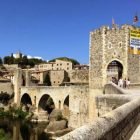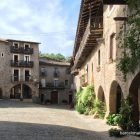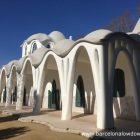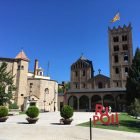Perched precariously on the edge of a fifty-metre basalt cliff, Castellfollit de la Roca is one of Catalonia’s most picturesque and instantly recognisable villages.
Built during the twelfth century on a rocky outcrop at the confluence of the rivers Fluvià and Turonell, at its narrowest point, the medieval village of Castellfollit de la Roca is just two houses wide.
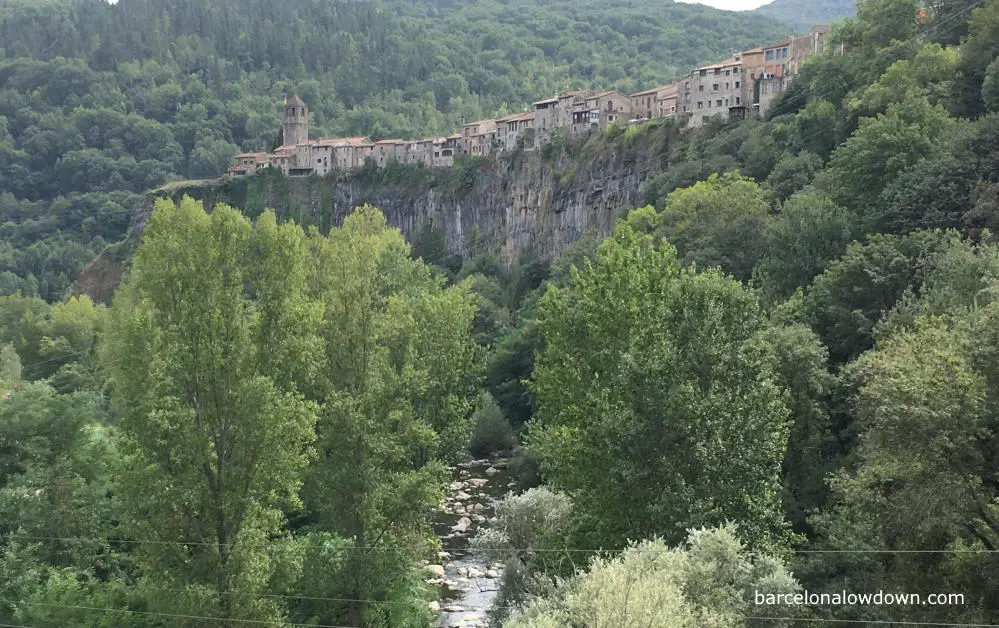
What to see and do in Castellfollit de la Roca
1. The “Passarel·la Mirador” viewpoint
I’m ashamed to admit that I didn’t prepare our visit to Castellfollit de la Roca very well and we actually missed the village’s main attraction!
The photo above was taken from the bridge on the main road leading to the village. Although the view’s pretty good, it turns out that there’s a more impressive view to be had from a wooden footbridge that crosses the River Fluvià at the foot of the cliffs.
To get to the viewpoint, turn off the main road in front of the sign to Oix and Beget and follow Carrer de les Fabriques down to the river. If you’re using Google Maps, search for “Passarel·la-mirador de Castellfollit de la Roca”.
If you miss the junction, you can turn around in the car park of Hostal Mont-Roc, just before the road bridge leading to the village.
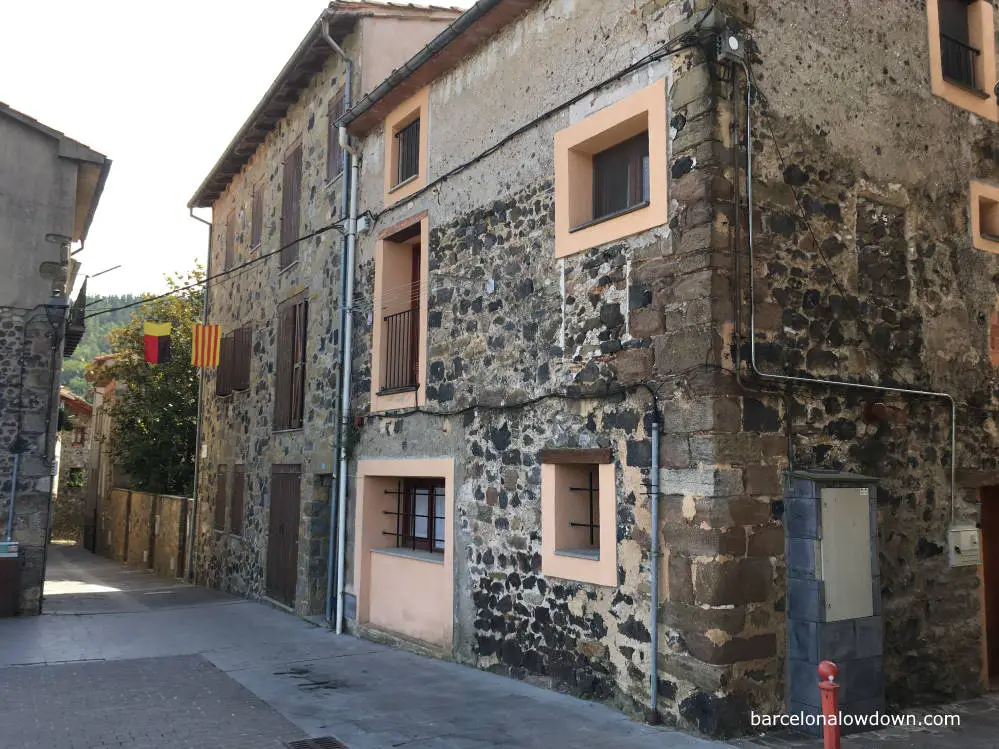
2. Explore the narrow streets of the old town
Castellfollit de la Roca is built on a lava flow that was produced by the eruptions of two volcanoes approximately two hundred thousand years ago.
During the centuries that followed, the rivers Fluvià and Turonell slowly eroded away the surrounding rock, leaving a narrow strip of basalt that is approximately one kilometre long, fifty meters high and between fifty and a hundred metres wide.
The rocky outcrop looks like a naturally occurring castle, and during the middle ages, a small walled village was built on top of the cliffs.
The earliest written reference to Castellfollit de la Roca dates back to 1110 AD, although many of the original buildings were destroyed by a devastating earthquake in 1427. Most of the buildings in the old town are made of distinctive black volcanic rock from quarries nearby.
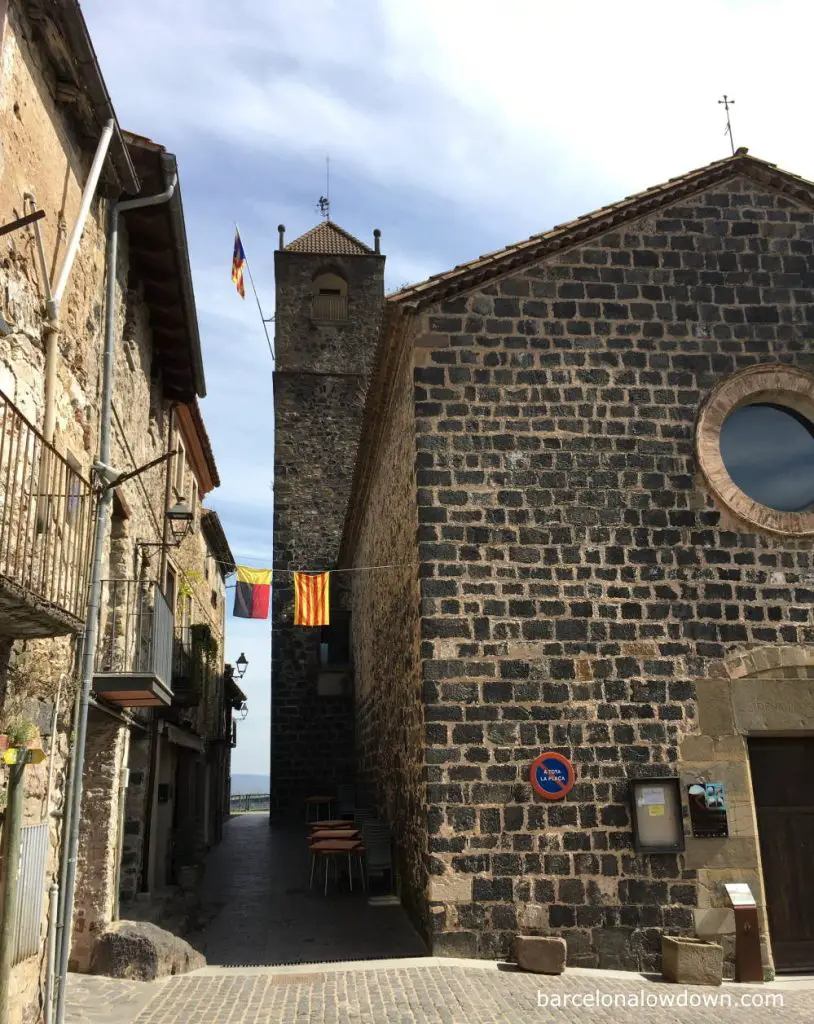
3. The “Old” Church of Sant Salvador
At the far end of the village stands the Church of Sant Salvador, which dates back to the twelfth century.
Over the centuries, the simple Romanesque church has repeatedly been destroyed and then rebuilt. After the Spanish Civil War, the church was in such a bad state that a new church, also dedicated to Sant Salvador, was built on the outskirts of town (see below).
More recently, the “Old” Church of Sant Salvador (Catalan: Església Vella de Castellfollit de la Roca) has been restored and is now used as a civic centre. Unfortunately, the church was closed when we visited. Usually, you can climb the tower to get striking ariel views of the village.
4. Mirador Josep Pla
Beyond the church, at the far end of Castellfollit, a small plaza dedicated to the writer Josep Pla affords sweeping views of the surrounding area.
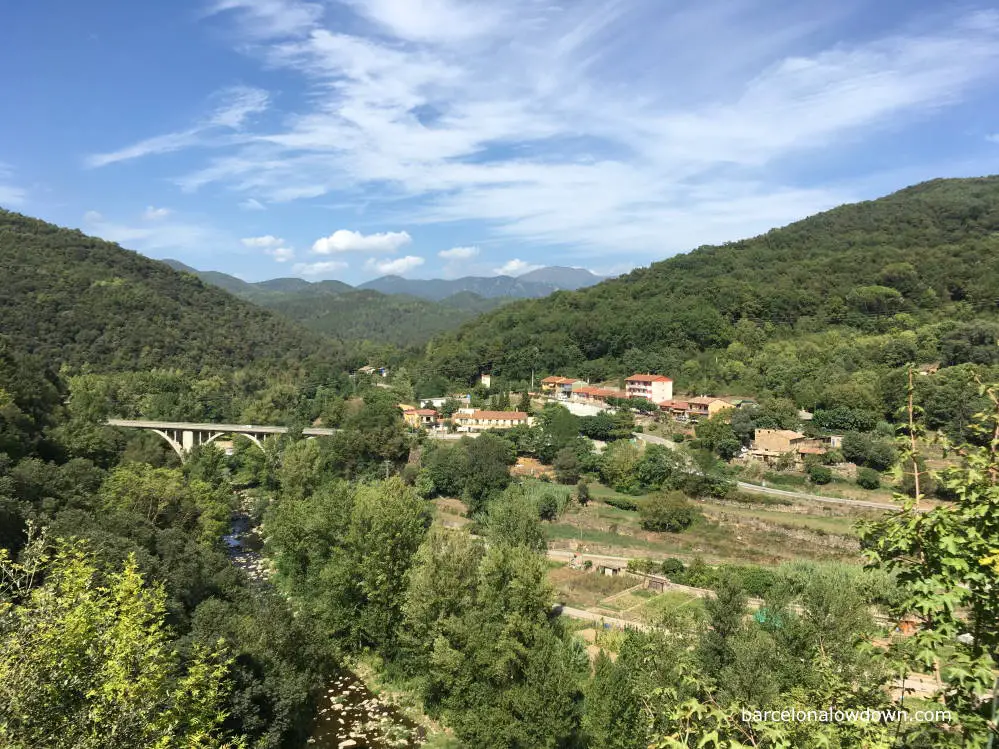
5. The Sant Roc Clocktower
At the entrance to the old part of the village stands a tall brick clock tower that dates back to 1924. Apparently, the building was paid for by local politician Lluís Pons in return for the villagers’ votes in an election that took place five years earlier.
6. The “New” Church of Sant Salvador
After the original church was burnt down during the Spanish Civil War, a new larger church was built on the outskirts of the village. The “new” church has a square floorplan and is reminiscent of the colonial-style churches found in Latin America.
Where to stay in Castellfollit de la Roca
We visited Castellfollit de la Roca as part of a day trip from Barcelona. If you decide to stay overnight, I’ve heard good things about Fonda Ca La Paula, which is located next to the clock tower at the entrance to the village. Apparently, the restaurant is excellent.
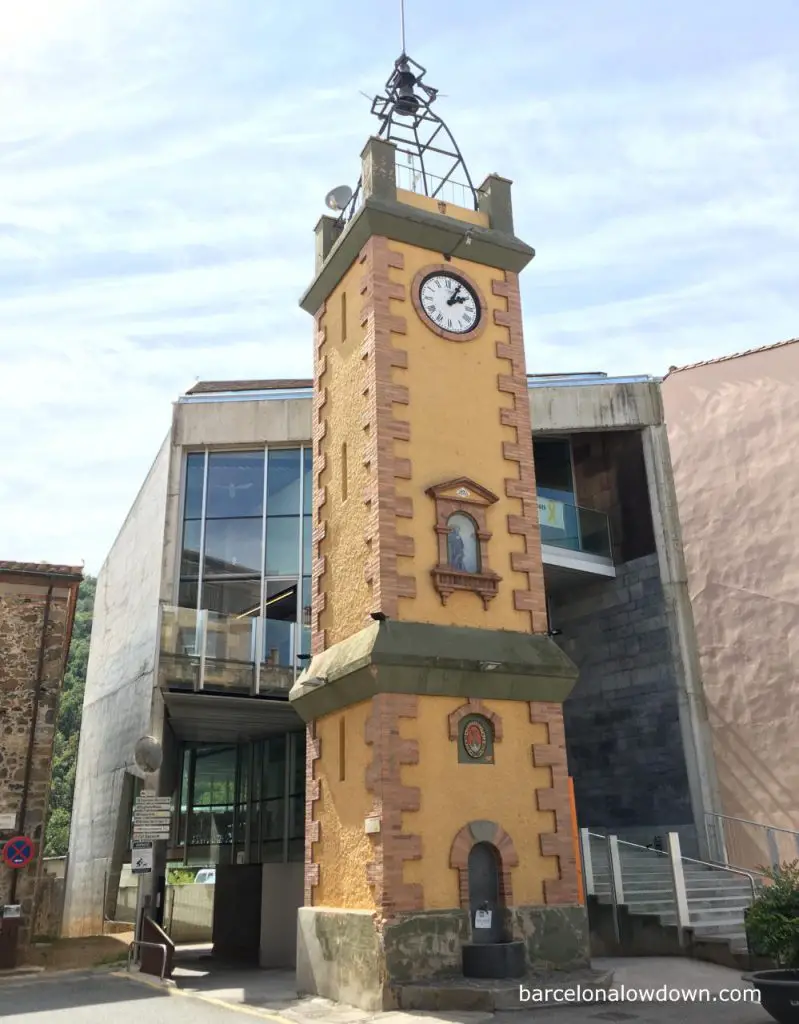
How to get to Castellfollit de la Roca and where to park
By Bus
There are four buses daily from Barcelona to Castellfollit de la Roca. Buses depart from in front of the TEISA bus company’s office at C/ Pau Claris, 117 in Barcelona. Timetables and prices here.
TEISA also run more frequent buses to Castellfolit de la Roca from Girona and Olot via Besalú and Banyoles.
By Car
The easiest way to reach Castellfollit de la Roca is by car. From Barcelona, take the AP-7 motorway to Girona, followed by the C-66 via Banyoles and Besalú towards Olot.
Castellfollit is located on the N-260z approximately nine kilometres before Olot. The journey takes a little under two hours.
There’s a small municipal car park near the entrance to the village at Carrer Nou number 28. Take care as you turn off the main road in front of the clock tower because the road is relatively narrow, and you may meet oncoming traffic.
If there’s no space in the car park, you can also park on the main road near to the new church.
Guided Tours
Get Your Guide offers several one-day tours from Barcelona, including one which visits Besalú, Tavertet, Rupit and Castellfollit de la Roca.
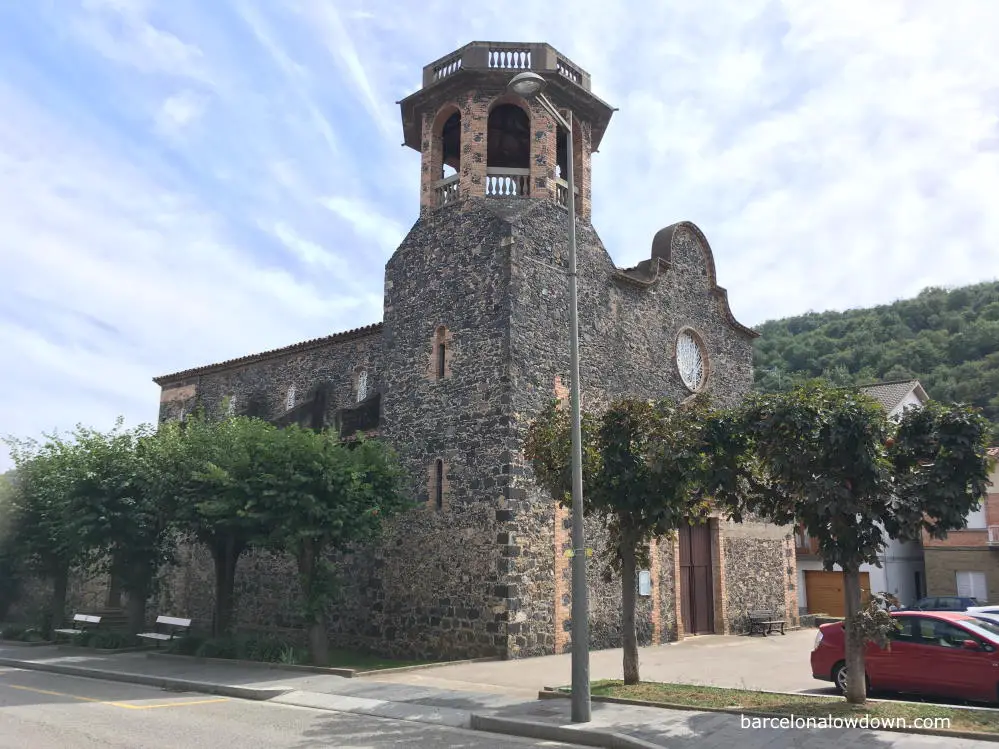
Places to visit near Castellfollit de la Roca
The Garrotxa Volcanic Zone
Castellfollit de la Roca is in the Garrotxa Volcanic Zone, which boasts no less than forty dormant volcanos. The volcanoes are small and are mostly covered with deciduous forests of beech and oak trees.
There are plenty of easy hiking trails in the area, including a popular circular route through the Fageda d’en Jordà beech forest and the Santa Margerida Volcano.
Besalú
Besalú is one of the best known and most picturesque medieval towns in Spain. The town’s main attractions are a sizeable Romanesque bridge and a thirteenth-century Mikveh (Jewish ceremonial bathhouse). There are several daily buses from Girona to Olot which stop at both Besalú and Castellfollit de la Roca.
Santa Pau
Santa Pau is another picturesque medieval village in the Garrotxa Volcanic Zone. If you want to get really spectacular views of the area, local company Vol de Coloms operate balloon flights from Santa Pau.
Girona
Famous for its well-preserved medieval city centre, pastel-coloured houses overlooking the river Onyar and for having been featured in series six of Game of Thrones. Girona is one of the most popular day trips from Barcelona.
Map of Castellfollit de la Roca
Zoom in to see the places mentioned in this post.
Castellfollit de la Roca, Girona
Castellfollit de la Roca, Girona
Castellfollit de la Roca, Girona
Castellfollit de la Roca, Girona
Castellfollit de la Roca, Girona
Castellfollit de la Roca, Girona
Mirador de Josep Pla, Castellfollit de la Roca, Girona

